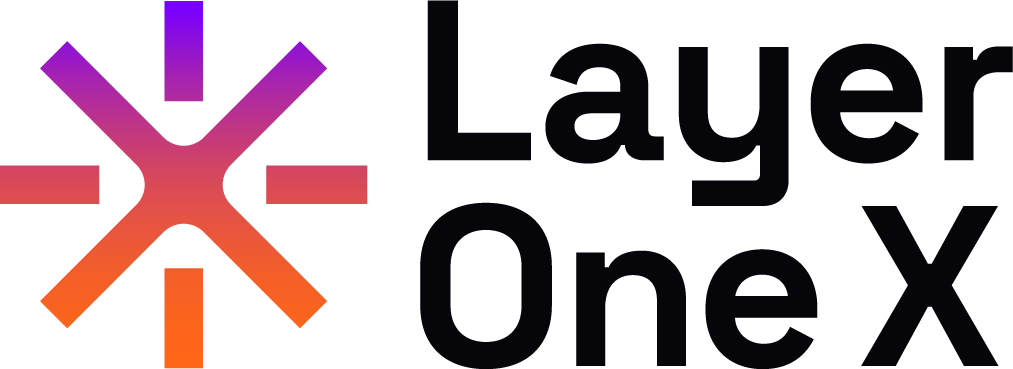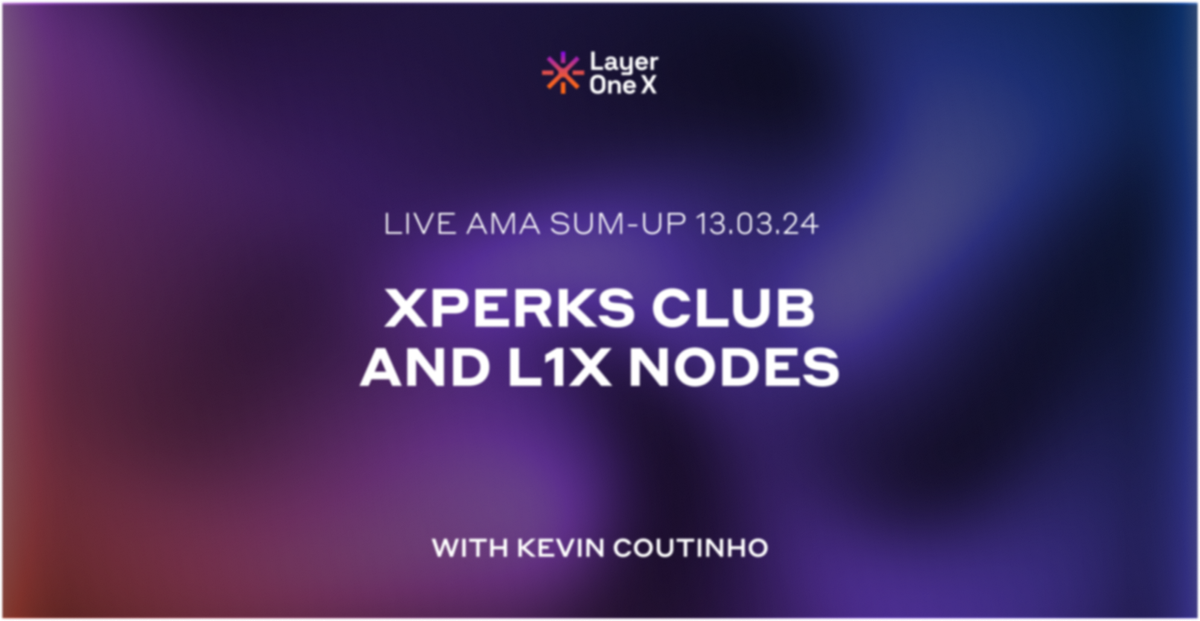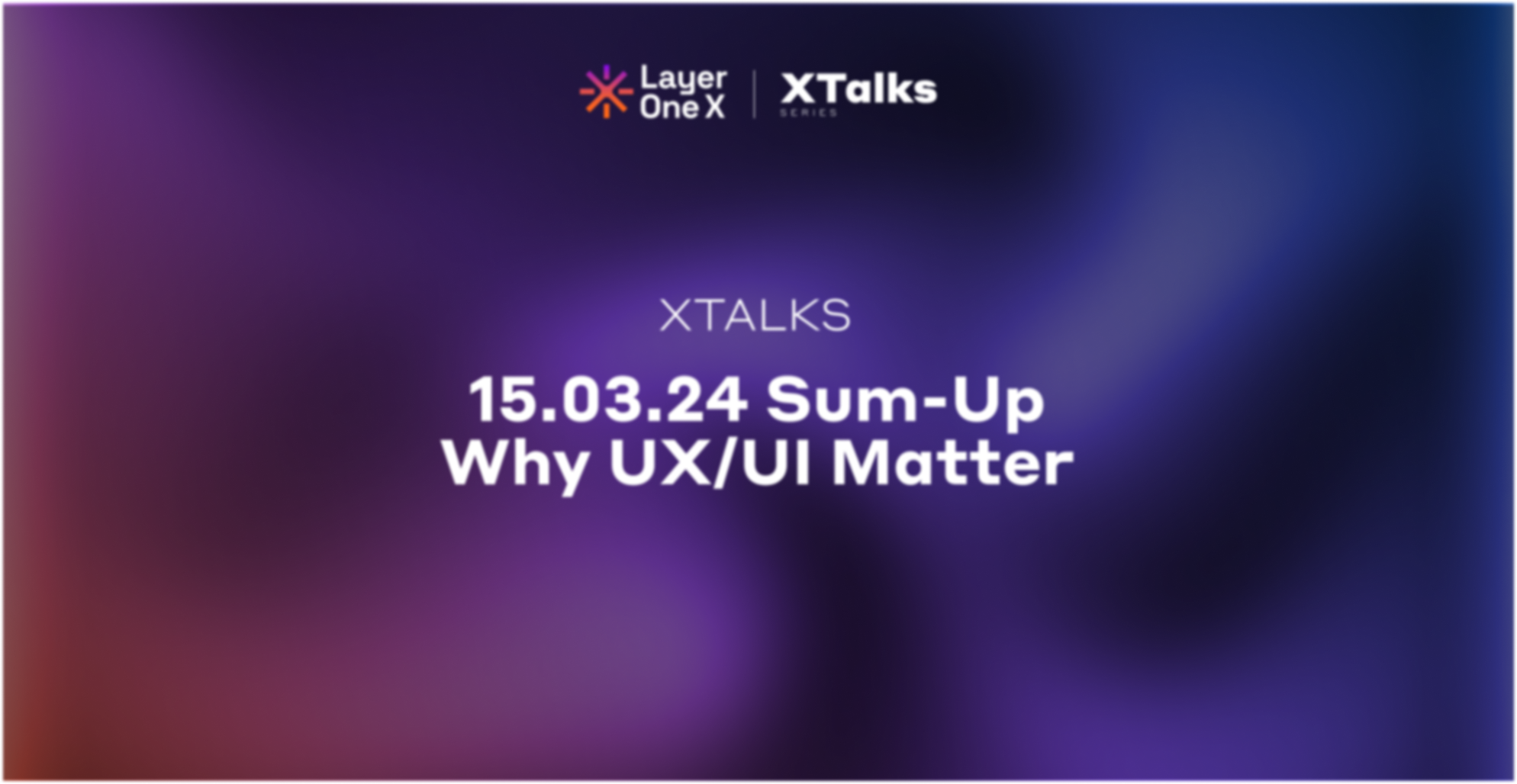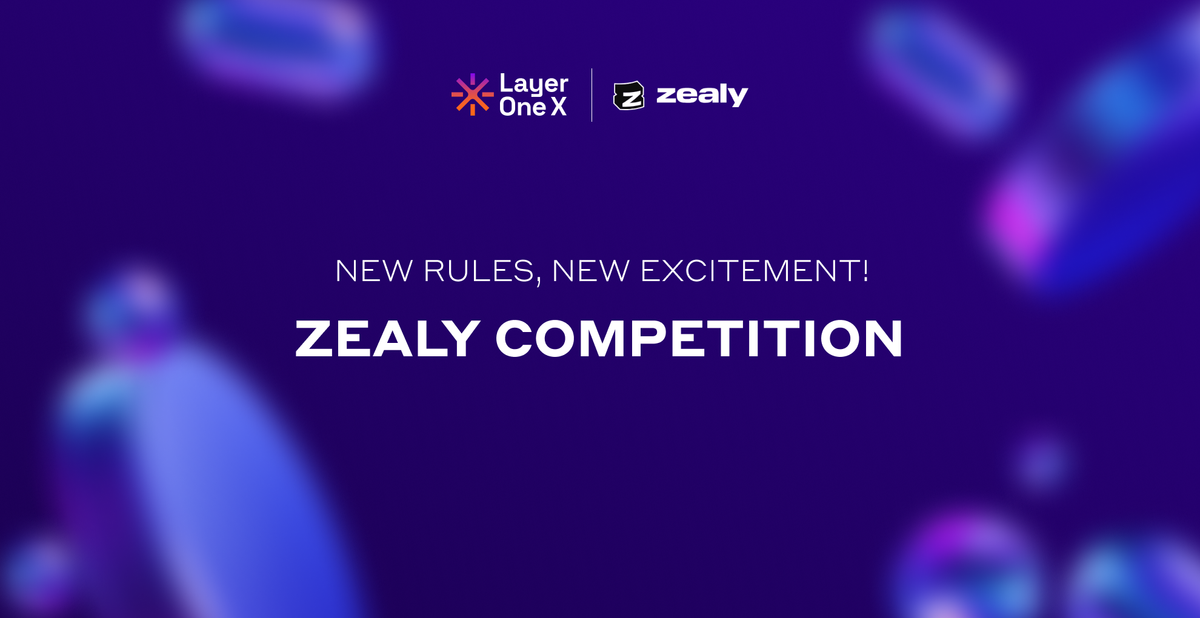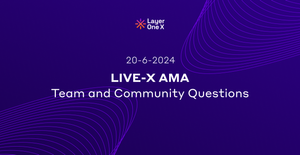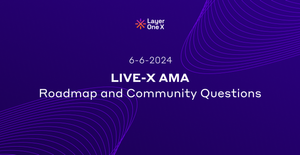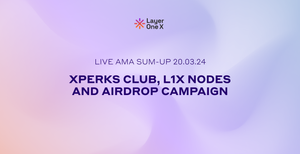Hey L1X Fam!
If you missed the Live AMA, we got you covered with a summary! Our Founder, Kevin Coutinho, and the COO, Matiu Rudolph, uncover the secrets of hosting node NFTs and explain in depth the new XPerks Club information.
Get ready to immerse yourself in the XPerks Club and Node NFTs Live AMA – it's the blockchain bonanza you don't want to miss!
WATCH THE FULL AMA
Section 1. Unveiling Node Hosting Essentials: Welcome to the AMA!
Kevin starts the AMA by covering the setup and operational requirements for hosting nodes in a network. He starts by introducing the two types of nodes: Event Listener Nodes (ELN) and Full Validator Nodes (FVN).
The focus is more on the FVN, which are responsible for state management and global consensus. The different types of clusters and the hardware requirements for hosting nodes are explained, including processor, memory, storage, and network speed. He details the options available for hosting nodes using Binaries or Docker images.
Section 2. Mastering Node Deployment: Binaries, Docker, and Beyond!
Check out the concept of Binaries and Docker images in the context of blockchain technology. Binaries are compiled executable files, while Docker images are multi-layered recipes that can run consistently across different operating systems. The benefits of using Docker include automatic library fetching, minimal setup, and easy updates. Kevin mentions releasing binaries for Debian-based or Ubuntu systems first, along with Docker images. He discusses the resource usage, dependencies, and configuration differences between binaries and Docker. He also touches on node hosting options, such as cloud providers, dedicated hosting, and running it on a laptop. L1X will release a calculator for estimating rewards from hosting a node, with a 40% APR as a comfortable number. Finally, introducing the L1X App and explaining the simple steps to achieve the desired node setup.
Section 3. Unlocking Rewards: Exploring the L1X Core System
Kevin discussed the L1X Core Navigation on the L1X App, which consists of four subsections: Claim, Data Sanitization, XPerks Vesting, and Node NFT.
The process involves verifying allocations, ensuring balances match, calculating bonus structures, and predicting rewards from node purchases. The system allows for configuring various variables such as expected L1X price, stake probability, validator commission, and node hosting fees to determine potential rewards over a period of time. He emphasizes the importance of strategic decision-making in node purchases to maximize rewards.
Section 4. Mastering Market Dynamics: Key Strategies for Participation
They discuss important aspects related to participating in the market. Once you vest, the number will increase on the FVN widget section. If you are not eligible for an FVN, you can top up by buying the required L1X Coins and then get a FVN. The video emphasizes that all those who had opted in for a FVN or ELN, will get their rights to reserve that Node that they had initially opted for, even if the price has decreased. It also mentions that users can top up with MetaMask if they don't have enough L1X Coins for the ELN.
Kevin introduces the updated Helpdesk Function on the L1X App, a streamlined process for submitting inquiries through the website directly to developers, reducing the workload and improving response times.
He also touches upon transaction fees and rewards for hosting nodes, highlighting the importance of understanding the fee structure from April onwards.
Section 5. Understanding Transaction Fees and Optimization Strategies
The video section explains the fee structure for transactions on the network. Users are informed of the fee limit for a transaction, and fees are deducted at each execution point. There is a tipping feature where users can keep part of the fee if tipping is enabled. Contract deployment fees are charged based on resource execution, storage, and read-only calls have no fees. Certain transactions have a deterministic fee, while others are based on transaction size. ELNs can charge fees for certain verifications. FVNs can also host data nodes, such as IPFS, which incur higher costs. There are recommendations for developers to optimize contract size and avoid overloading nodes to prevent increased fees.
Section 6. Exploring the XPerks Club Program
Matiu discusses the benefits of the XPerks Club program, which is designed to reward contributors who have participated in the Seed, Private and Public Sale. The program has three tiers: Silver XPerks, Gold XPerks, and Platinum XPerks, each with a different vesting period and bonus L1X coins. The bonus coins are given with a three-month cliff and vesting period ranging from four to six months depending on the tier. Participants in the program also have access to giveaways and airdrops, with Platinum tier members potentially receiving better rewards. Additionally, participants can unlock a node NFT by opting into the Gold or Platinum tier, which grants them the right to host a node. Public sale participants can unlock a Node NFT at any tier level. Read more about XPerks Club.
Section 7. Node NFTs and XPerks Program Enhancements
Matiu discusses the reduction in requirements for ELN and FVN, with the coin amounts needed to unlock these nodes being halved. This change allows more people to access node NFTs for hosting. Additionally, the launchpad will offer whitelisted allotments to those in the XPerks Club, with Silver and Gold Tiers having lottery whitelists and the Platinum Tier having guaranteed whitelists. To prevent gaming the system, a minimum of 1,000 L1X Coins is now required in any tier to access the launchpad. The more coins you have in a tier, the better your chances of earning a whitelist allocation.
The Alpha Club access within the L1X App will provide exclusive content and updates for Gold and Platinum Tier members who opt-in. The vesting period for XPerks bonuses has a three-month cliff, with varying vesting periods for Silver, Gold, and Platinum Tiers. Platinum Tier offers a 20% bonus coins after the cliff period. To unlock a node NFT, a Gold or Platinum Tier must be selected for seed and private sales, while any tier can be selected for public sales.
Section 8. XPerks Club Opt-In Process
Being discussed is the XPerks Club and the process of opting into different tiers within the club, mentioning that around 50-60% of people who acquire node NFTs actually go on to host them. Priority for hosting nodes is given to those in the Platinum Tier. Other benefits of the XPerks Club include giveaways, airdrops, access to the Launchpad, allocations, and the Alpha Club.
The opt-in process involves connecting your XWallet to the L1X App, reviewing available tiers and benefits, selecting the tier(s) you wish to join, and confirming your selection. There is a three-month cliff period for each tier, with the vesting of bonus coins and original coins starting after this period. Opting in by April allows for April to be the first month of the cliff period while opting in later will adjust the start of the cliff period accordingly.
Section 9. Opting into XPerks Club and Tracking Bonuses with L1X App
Delve into how participants can opt-in and track their bonuses through the L1X App. They emphasize the importance of opting in early and provide details on how to view bonus coins, vesting periods, and the claiming process. The program is exclusive to active and contributing community members and investors who have been involved in public sales. The benefits of different membership levels is also explored, such as platinum, which includes priority access to node hosting. Additionally, mentioning updates to Explorer and a forthcoming document on node hosting, which will involve Docker-based configurations and various settings for hosting nodes.
Section 10. Private Node Hosting: A Comprehensive Guide to Deployment and Configuration
Kevin delves into the intricacies of setting up private nodes and deploying contracts within a closed network. And covers the essential steps such as syncing with peers, enabling replication, and configuring parameters like fee and rate limits. Additionally, discussing key aspects such as node-level information, private key setup, and configuration adjustments through node agreement. The importance of the Testnet environment, minimal operational requirements, and simplified node startup scripts are also highlighted. Furthermore, outlining the expected timeline for FVN hosting release and upcoming plans for user guidance seminars and binary releases tailored for VPN-based operating systems.
Section 11. Navigating Node Hosting and Staking
The AMA covers the process of hosting nodes and staking in the context of cryptocurrency infrastructure. It is mentioned that in April, 80 FPNs (Full Proof Nodes) will be allowed to host, and transaction fees will be initialized.
Users will not waste transaction fees, and they have the freedom to do what they want with them. Staking is a service where individuals can start earning L1X Coins and secure the protocol. A dashboard will display hosted nodes and their configurations, such as validated commission and node score, which determine decision-making rights. It is explained that ELN will start in May to ensure the proper configuration and functionality of FVN before introducing them. ELN will also support various coins and tokens, contributing to multi-chain liquidity. It is important to join the queue early to secure a hosting position. Kevin showcases an Excel sheet analyzing the current node landscape, mentioning reward rates and minimum USD value requirements for hosting nodes. There's a potential impact of price fluctuations on node accessibility and the benefits of early participation for investors.
Section 12. Navigating Node Hosting: Challenges, Rewards, and Opportunities
Kevin discusses the challenges and risks associated with hosting nodes based on reward rates and coin prices. And mentions that currently, with the market being bullish, it may not be the best time to get into node hosting as it involves a significant gamble due to potential price fluctuations. However, highlights the benefits of deterministic block rewards and tradable node NFTs as attractive features for node hosting providers, and emphasizes the importance of securing the network and mentions a validator pool that will provide stable reward percentages over a five-year period. It is also mentioned that early adopters may be rewarded more due to deterministic block rewards and the potential for higher rewards if fewer nodes are hosted, encouraging viewers to start hosting nodes and explains how individuals who have invested in tokens can still participate in node hosting by unlocking node NFTs.
Section 13. The Benefits of Node NFT Hosting
In this video section, Matiu discusses the benefits of hosting a node NFT and earning block rewards and commissions. By hosting a node, you can earn block rewards even if you have allocated the minimum amount of coins due to vesting. Additionally, you can earn extra commissions from delegated stakers, who stake on your node. The AMA also mentions that Platinum members will have priority in the queue for node NFTs. The availability of node NFTs is expected to be between Friday and Tuesday next week, with a dedicated team of developers working on testing and implementation. The process of opting in for node NFTs is expected to take around 10 minutes, based on user statistics. The top-up feature allows users to add coins for node opting, and opting for a new node does not affect the reservation of previously reserved nodes.
Section 14. Reserving ELN and Exploring Hosting Options
Matiu discusses the process of reserving eventless nodes and the option to top up for them. They explain that users can change their reservations and opt for different types of nodes, such as FVN nodes. Hosting a node is described as not being as difficult as it may seem, with the process being explained step by step. Additionally, mentioning that node NFTs are sellable, providing multiple benefits, and compare hosting a node to using torrents, stating that it's similar. Questions are addressed regarding LP rewards and the sustainability of reward rates for L1X, emphasizing that the tokenomics have been calculated to ensure sustainability. And discuss the importance of transaction volume and the role of FVN in validating transactions on the ONX protocol. Finally, explaining the requirement to maintain a minimum number of coins to secure a hosted node and clarify that the node NFT and coins are separate entities.
Section 15. Insights and Recommendations: Node Hosting and Staking Q&A
Kevin and Matiu discussed various questions related to node hosting and staking in this section of the video. They mentioned that combining wallets to meet the minimum staking requirement is not allowed, each wallet must go through the process individually. They also touched on the possibility of third-party node hosting services, advising that it may be better to host your own node. Kevin recommended having separate laptops for each node to avoid all nodes crashing if one laptop fails. He clarified that both the Launchpad and Alpha Club require a minimum stake of a thousand L1X coins. Additionally, they explained the process of making coins tradable through XPerks and emphasized the importance of going through this process, mentioning upcoming documentation for connecting a hardware wallet to the XPerks Program.
Section 16. Tips and Insights for L1X Coin Procurement
Kevin discusses the process of safely obtaining L1X coins through node sales, emphasizing the need to opt in for a node rather than simply purchasing coins. They explain that having a minimum internet speed of 100 MBPS is important for running a node efficiently, but it is not the only factor affecting performance. Kevin addresses a question about using a gaming processor with 8 GB of RAM to run a node, stating that it is sufficient. They also explain that validated commissions for staking cannot be changed mid-period and must be honored for the month in which they were set. Unbonding time for stakers is 30 days, providing a buffer against impulsive decisions and promoting stability in the network. The speaker also touches on differences in staking APIs between FVN and ELN, highlighting the ability to stake LP tokens and coins from other protocols in ELN as a competitive advantage.
Section 17. Exploring Transaction Fee Distribution and Node Infrastructure Optimization
Kevin discusses the probability of distributing transaction fees to people who stake in order to compensate for the fees. And Matiu mentions the benefits of staking with ELNs and the advantages of hosting an ELN with a commission structure. They also talk about the potential increase in FVNs and ELNs, as well as the importance of node NFTs in determining who can host a node. They explain the penalties for unreliable nodes and mention the availability of stats to monitor node performance, and that nodes are reserved for one month, and discuss the possibility of implementing dynamic commission structures in the future. The video ends with a discussion on the node infrastructure and the importance of building a strong foundation for future developments.
Section 18. Unlocking the Future: Node Economics and Infrastructure Perspectives
Kevin discusses the benefits of building on a protocol that allows for easy infrastructure attachment, leading to increased transaction probability. They highlight the importance of multi-chain asset issuance and management, emphasizing the ease and cost-effectiveness of doing so. He expresses interest in node NFTs and believes in the potential of protocols like Polkadot for interoperability. They plan to opt-in for multiple nodes but will not utilize all their coins to prevent centralization. The importance of factors like commission rate and uptime for delegated stakers is also discussed, along with the potential rewards for hosting nodes. He sees node hosting as a unique opportunity to secure multiple ecosystems and facilitate communication between different chains.
Section 19. Seizing Early Opportunities: XPerks Tiers and Community Engagement
Kevin and Matiu discuss the importance of getting into the XPerks early and the different tier structures, mentioning the availability of coins for XPerks, including Private Seed, Public, and Referral coins. Referral coins from different sources will have different vesting periods. Kevin emphasizes the opportunities for hosting nodes and XPerks, and jokes about the need for energy drinks and coffee between Friday and Tuesday for important events. They also talk about the significance of community involvement and answering questions. The video ends with thanking the audience and encouraging them to stay tuned for future updates.
FAQs
Q: Can LP Rewards be used towards Node NFTs?
A: No, LP Rewards cannot be used towards Node NFTs. The bonus L1X Coins received from the Liquidity pool are not vested and do not have to go through the XPerks program.
Watch this question.
Q: Is the reward rate sustainable in the long-term for L1X?
A: Yes, it is. The sustainability of the reward rate has been thoroughly considered in the Tokenomics. The circulating supply has been calculated based on the validator pool, and emissions rates into the circulating supply from the validator pool have been accounted for. This ensures the distribution into the pool remains lucrative.
Watch this Question.
Q: If I take profits and this drops the minimum requirement of coins securing the Node being hosted, is the Node forfeited?
A: To maintain a hosted Node, a minimum of 25,000 L1X Coins must be maintained. If the minimum requirement is not met, the Node may be forfeited unless additional coins are acquired. Watch this question.
Watch this question.
Q: Can multiple wallets holding the required amount of coins for an FVN or ELN combine to Vest in Platinum, for example?
A: No, each wallet must undergo the Vesting process separately. One Wallet corresponds to one process. Watch this question.
Watch this question.
Q :Will there be a service for third-party node hosting where the hoster does not have to take any action?
A: While such a service may be possible in the future, the current infrastructure of the L1X App is designed to facilitate node hosting effectively. Setting up and managing your own Node is encouraged.
Watch this question.
Q: Can XPerks be accessed through a Ledger wallet?
A: Integration with Ledger wallets might come in the future, and detailed documentation will be provided for the safest method of connection.
Watch this question.
Q: What is the minimum requirement for Alpha Room Access?
A: Alpha Room Access requires a minimum of 1000 L1X Coins.
Watch this question.
Q: What is the unbonding time for stakers?
The unbonding period for stakers is set at 30 days. This period is in place to prevent impulsive decisions and maintain stability across the infrastructure.
Watch this question.
Q: Do staking APRs differ between FVN and ELN?
A: While FVN rewards may be higher initially, ELN rewards will also be competitive. The ability to stake LP Tokens and coins from other protocols into ELN will contribute to its attractiveness, along with potential transaction fees.
Watch this question.
Q: How are decisions made regarding the issuance of Node NFTs?
A: Decisions regarding the issuance of Node NFTs are typically made by current Node owners or individuals hosting the nodes, with consideration for the protocol's best interests. Watch this question. Watch this question.
Q: Is there a slashing fee for Node owners?
A: A slashing fee may apply if a Node's performance drops below certain criteria, such as being offline for an extended period. This penalty encourages responsible Node management.
Watch this question.
Q: What is the duration for which Nodes are reserved?
A: Currently, Nodes are reserved for 1 month.
Watch this question.
Q: Are Node hosting commissions dynamic?
A: At present, Node hosting commissions are fixed, but the potential for dynamic commissions can be explored based on hoster requirements.
Watch this question.
Check out the Full Documentation:
Stay updated on Discord and in our Social Media Channels so you don't miss any important News.
